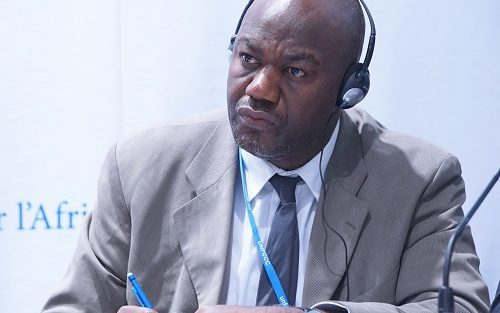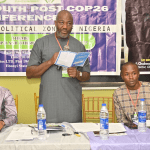The President, Society for Planet and Prosperity (SPP) and Director, Centre of Climate Change and Development, Alex Ekwueme Federal University, Ebonyi State, Nigeria (AEFUNAI), Professor Chukwumerije Okereke, was guest speaker in a webinar hosted by the Association of Sustainability Professionals of Nigeria (ASPN) on February 24 as part of the 2022 induction programme of the professional body.
The webinar had “COP26 and Nigeria’s Net Zero Commitments-Analysing the Facts, the Implications” as its theme and was intended to engage sustainability stakeholders, some of which include Government Ministries, Departments and Agencies (MDAs), key players in Nigeria’s private sector (particularly those in the oil & gas, energy, financial services, manufacturing, real estate and construction, agriculture, telecommunications, transportation, other sector players), media and civil society groups, and environmental and social risk practitioners on result-oriented discussions around Nigeria’s climate-related threats and opportunities, and its readiness to deliver on its global commitments to tackle climate change.
Minister of State for Environment, Chief Sharon Ikeazor, was represented by Mrs Iniobong Abiola-Awe, Director of the Department of Climate Change (DCC).
Professor Okereke delivered a speech titled the “Nigeria’s Climate Commitments and Implementation Readiness: Workable Strategies, Frameworks and Regulations”. In his presentation, he stated that Nigeria has shown a determination to deliver ambitious climate commitments, pronouncements, and pledges in an era of austerity but noted that concerted effort was now needed to translate the pledges into concrete policies and actions that will help Nigeria build resilience to climate change and achieve sustainable green economic growth.
Professor Okereke cited the revised NDC which has 20% unconditional and 47% percent condition emission reduction pledges, the 2050 Long-Term Vision for Nigeria (LTV-2050), the Nigeria Energy Transition Plan, the 2060 net zero pledge by President Buhari at COP26 in Glasgow, the Nigeria Climate Change Act and the ongoing Nigeria Deep Decarbonation Project (DDP- Nigeria) as some examples of the credible and ambitious climate efforts made by the government.
Professor Okereke highlighted several concrete steps that Nigeria can take to move beyond policy pronouncements into implementation state. He noted that Nigeria has not yet developed full GHG inventory (GHGI) and prescribed the key next steps on this to include the establishment of institution for the oversight and coordination of data; establishing data collection, documentation and management system; building a full MRV capacity and improving MRV system over time.
On policy and science, Okereke urged for designing and review of the current mitigation policy landscape, the development of a detailed appraisal of priority actions for key sectors, and open access to financing of mitigation actions. He said several climate actions such as clean cooking, climate smart agriculture, distributed renewable energy, green transportation and energy efficiency have the potential to deliver climate objectives as well as wider sustainable development goals such as green jobs, clean air, better health, food and energy security. He said more modelling work and economic analysis were required to quantify net benefits and aid science-based policy.
Professor Okereke said a big area of opportunity for climate action in Nigeria is to mainstream climate change into other sectors of the economy including transportation, water and irrigation, energy, etc. He said that according to the Federal Ministry of Finance, Nigeria’s core infrastructure stock is currently estimated at 30% of GDP and falls short of the international benchmark of 70%.
He observed that Nigeria’s aspiration and infrastructure target for 30 years is estimated to need no less than $3 trillion infrastructure investment. He also said cited the IFC figure, saying that the Paris Agreement has opened nearly $23 trillion in opportunities for climate-smart investments in emerging markets between now and 2030.
Professor Okereke said that investing in green infrastructures is the only way for Nigeria to scale up climate implementation and achieve long term low carbon and climate resilient development.
While making reference to the estimated cost of implementing Nigeria NDCs valued at $177 billion, he decried the paltry climate finance status of Nigeria and recommended that Nigeria establishes an institutional arrangement for the oversight and coordination of climate finance activities, identifies funding gaps and needs, assesses public and private financing options and develops a country climate investment plan among other financial recommendations.
He expressed hope that the new Nigeria Climate Change Act as signed by President Buhari provides a robust legal framework needed to improve Nigeria’s readiness and drive a full-scale implementation of climate change action that will put Nigeria on the path to a just and green economy.
By Gboyega Olorunfemi and Ethelbert E. Anieze, Society for Planet and Prosperity (SPP)






